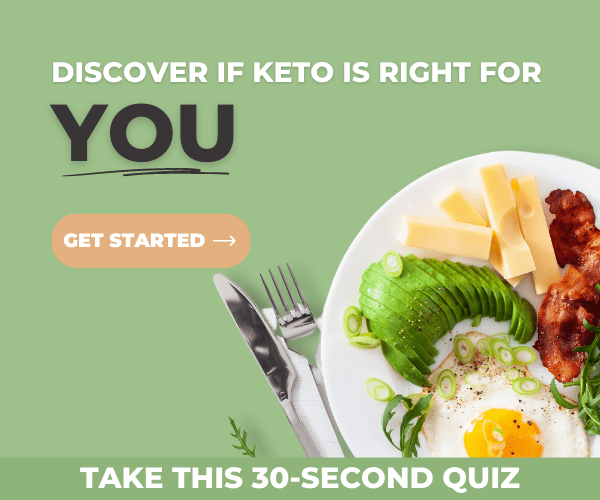
Protein is one of the most important nutrients, and not getting enough of it can negatively affect your health and body composition. Protein should be consumed in moderation on the ketogenic diet, but one of the most common questions we see is “How much protein should I eat?”
So, let’s go over how much protein should you be eating on keto and whether or not you eat enough protein.
Protein Intake
Most official health and nutritional organizations recommend a bare minimum of 0.36 grams of protein per pound (0.8 grams per kg) of body weight. This DRI (Dietary Reference Intake) is around 46 grams daily for the average sedentary woman and 56 grams daily for the average sedentary man. Keep in mind that this is the bare minimum amount of protein that your body needs to carry out daily functions, if sedentary.
 If you’re at a healthy weight and you don’t exercise much or lift weights, it’s a good idea to aim for the recommendation of at least 0.36-0.6 grams per pound (0.8-1.3 gram per kg). This is around 56-91 grams daily for the average male and 46-75 grams daily for the average female.
If you’re at a healthy weight and you don’t exercise much or lift weights, it’s a good idea to aim for the recommendation of at least 0.36-0.6 grams per pound (0.8-1.3 gram per kg). This is around 56-91 grams daily for the average male and 46-75 grams daily for the average female.
While this may be sufficient to prevent a deficiency, the specific amount of protein you need depends on various factors, such as your age, activity level, overall health, physique goals, and muscle mass.
Athletes will require greater amounts of protein in order to maintain muscle mass, prevent muscle loss (atrophy), and promote muscle growth.
What is Protein?
Protein is an essential macronutrient for life and one of the main building blocks of your body. Your body uses protein to make tendons, organs, muscles, skin, enzymes, neurotransmitters, hormones, and more.
To say protein is important is an understatement. Protein chains are made up of smaller molecules called amino acids that link together and form complex shapes. Some of these amino acids are essential, and you need to get them from your diet.
Protein Quality
Protein isn’t just about quantity; it’s also about quality. Animal protein gives you all essential amino acids in the right ratio for your body to properly use them. If you’re consuming animal products like fish, meat, eggs, or dairy, you’re likely getting enough good-quality protein. It’s also a good idea to go for higher quality protein and look for labels and certifications like:
- Wild-caught (seafood)
- Grass-fed (beef)
- Pasture-raised
- Cage-free
- Organic
These labels and certifications aren’t perfect, but they generally mean the protein is of higher quality. Some of these labels mean the animal was in their natural environment and fed their natural food. For example, grass-fed means the cow was fed grass, which is the natural food for cows, compared to genetically modified and highly processed corn and grains, which can lead to the cows becoming sick and overweight.
Protein for Vegetarians and Vegans
 If you’re vegetarian and you don’t eat animal foods, it’s a little more challenging to get all the protein and essential amino acids your body needs. Most plant-based proteins are incomplete protein sources, meaning they don’t contain all 9 essential amino acids (the amino acids you have to obtain through diet because your body can’t make them).
If you’re vegetarian and you don’t eat animal foods, it’s a little more challenging to get all the protein and essential amino acids your body needs. Most plant-based proteins are incomplete protein sources, meaning they don’t contain all 9 essential amino acids (the amino acids you have to obtain through diet because your body can’t make them).
Some people might also need to consume more protein, such as pregnant women, older adults, and people with diminished muscle mass and weakness. If your job is physically demanding or if you swim, run, walk, or exercise a lot, you should also eat more protein.
For older adults, getting enough protein might help prevent osteoporosis and sarcopenia.
Benefits of Protein
Protein provides many benefits, such as increasing satiety and helping with weight loss. For optimal weight loss, some experts recommend a protein intake of around 30% of calories. This is around 150 grams daily for someone on a 2,000-calorie diet. To calculate this, multiply your calorie intake by 0.075.
Protein might also boost metabolism. Eating more protein makes it easier to stick to a diet, such as a ketogenic diet. Some people even consume a keto carnivore diet where much of the calories are from animal protein and fat.
How Much Protein Should I Eat To Build Muscle?
Your muscles are largely made up of protein and your body must synthesize more muscle protein than it breaks down to gain muscle. Higher protein consumption can help build muscle and strength. Eating enough protein also helps you prevent the muscle loss that typically occurs with dieting and the loss of body fat.
If you want to build muscle, a common recommendation is 1 gram of protein per pound (2.2 grams per kg) of body weight. Some scientists estimate protein should be a minimum of 0.7 grams per pound (1.6 grams per kg) of body weight. With varying conclusions, it isn’t exactly clear how much protein you should consume for muscle building. A reasonable estimate seems to be 0.7-1 grams of protein per pound (1.6-2.2 grams per kg) of body weight.
How Do You Get More Protein in Your Diet?
The best protein sources are meats, eggs, fish, and dairy products because they contain all the essential amino acids your body needs. Some plants are fairly high in plant protein, such as legumes and nuts.
Most people don’t need to track their protein intake. If you’re healthy and trying to maintain your good health and you’re eating quality protein sources with most of your meals, your protein intake should be in an optimal range.
How Much Protein Are You Consuming on Keto?
Have you found yourself asking how much protein should I eat on keto? Have you calculated how much your should be eating and found that it’s not enough? Comment below and share your top tips for increasing your protein intake with the community!









